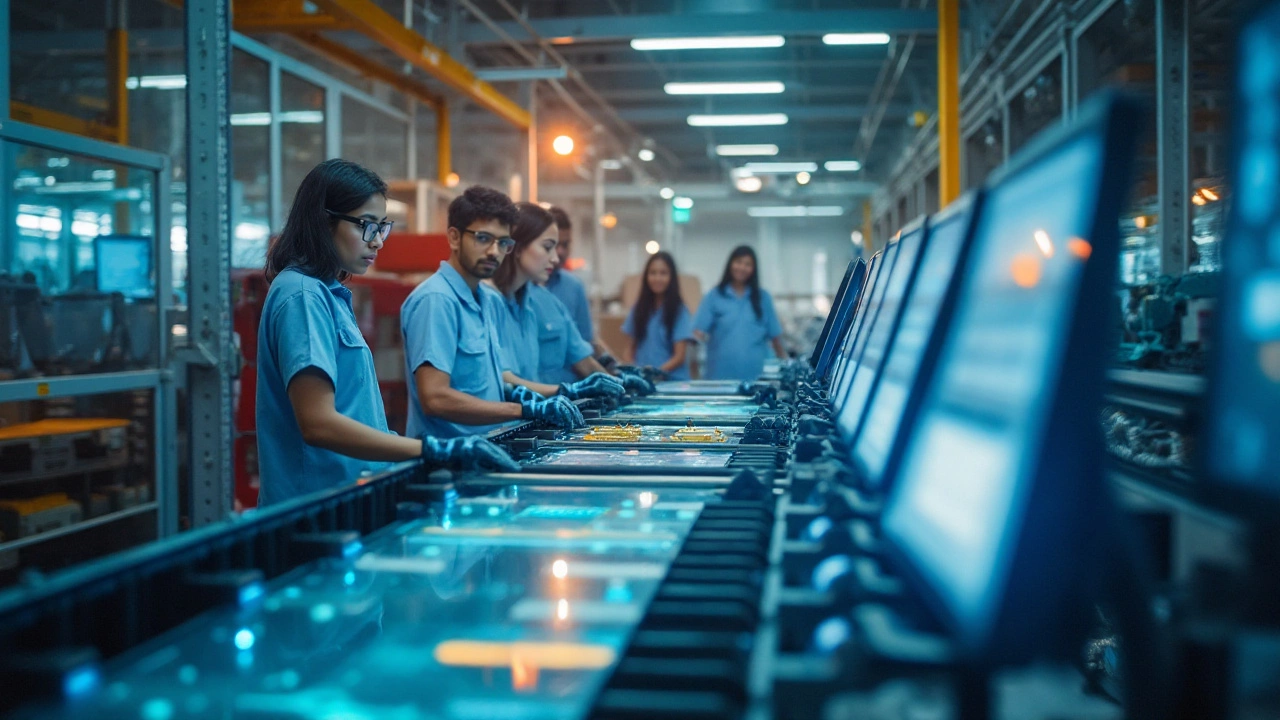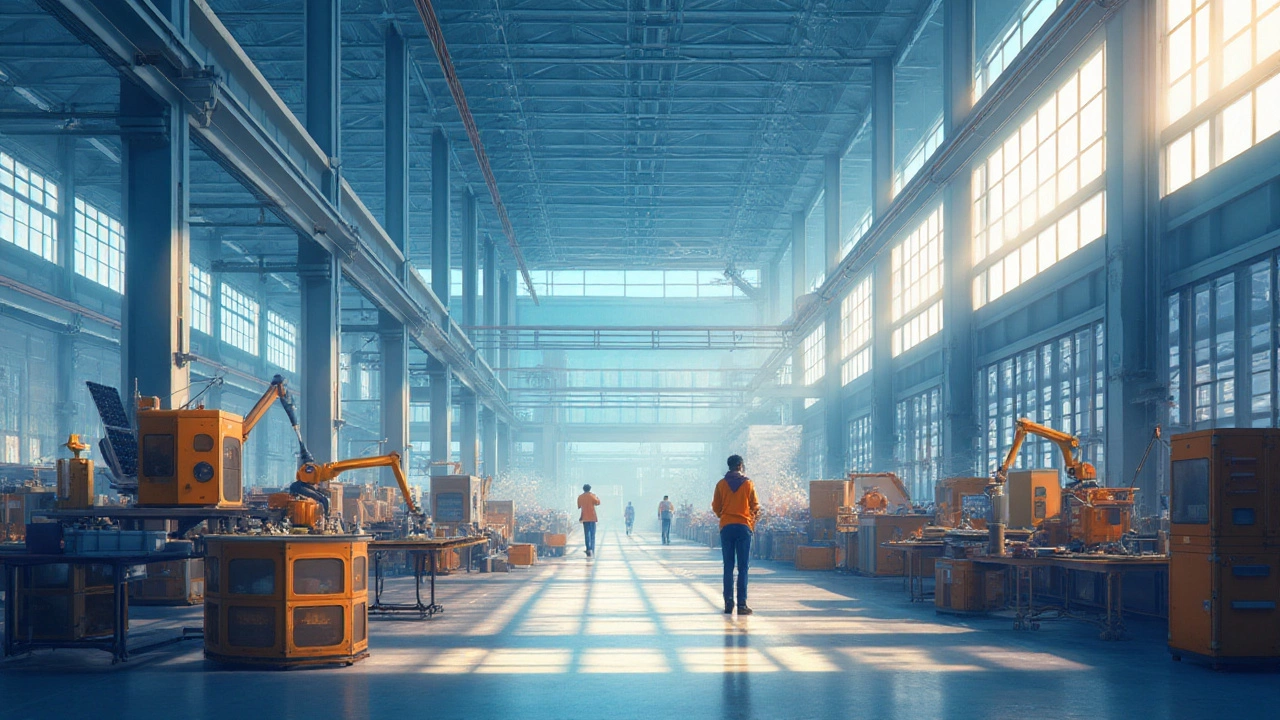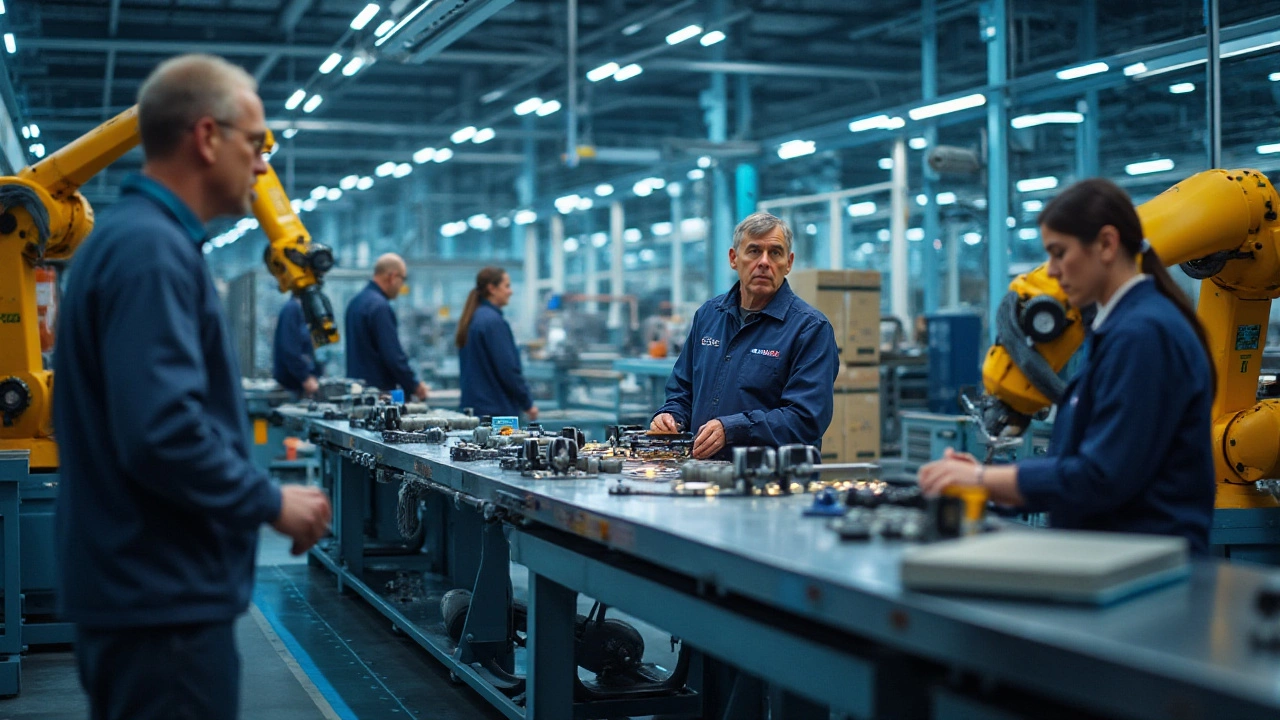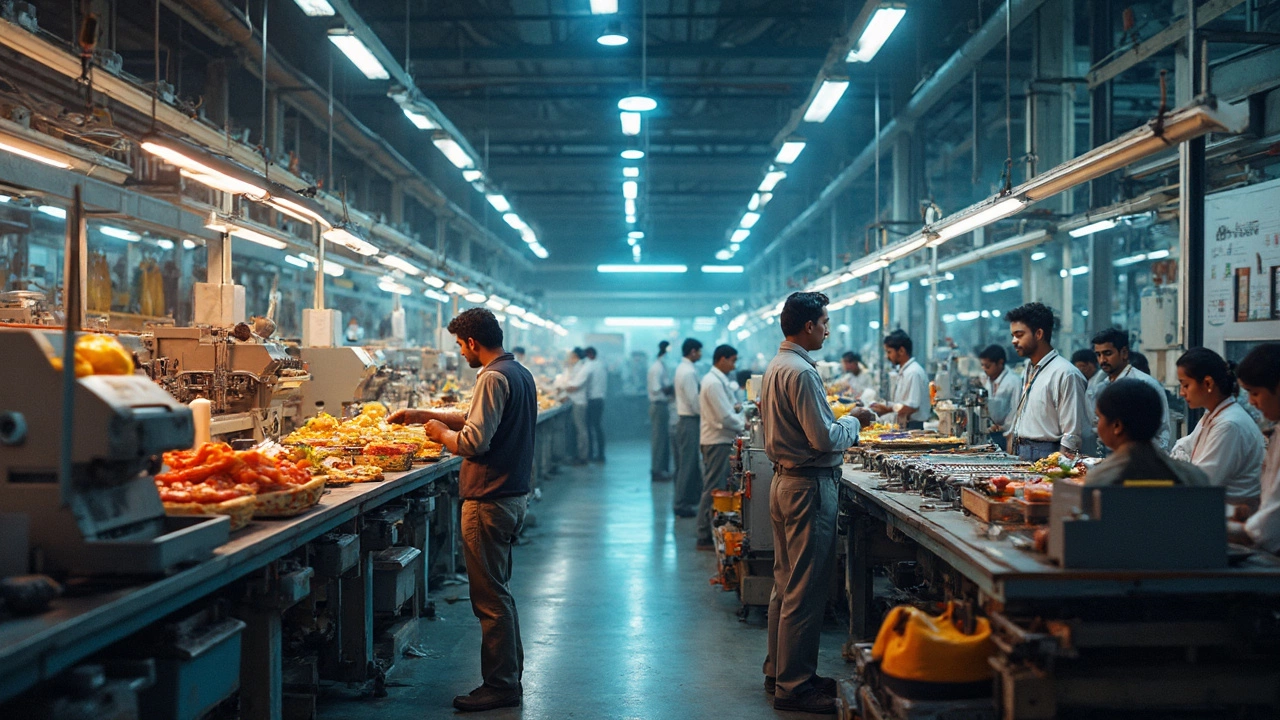Discover the Top Manufacturing State in the US for Startups

In the dynamic landscape of American industry, manufacturing continues to play a pivotal role, contributing significantly to the economy. As technology and innovation progress, certain states have emerged as leaders in this domain, offering fertile ground for startups to plant their roots. Among them, one state stands out, not just for its sheer volume of output but also for its rich ecosystem that nurtures and promotes manufacturing endeavors.
Within this leading state, a combination of factors such as resource availability, skilled labor, and a supportive business environment creates a unique haven for new manufacturing ventures. This article delves into the strengths of this state, uncovering why it is a magnet for entrepreneurs in the manufacturing arena. From understanding its infrastructure to grasping the opportunities that lie ahead, we aim to provide a comprehensive guide for those eager to dive into this sector.
- The Leading State in Manufacturing
- Key Factors Contributing to Manufacturing Success
- Opportunities for Startups in the Manufacturing Sector
- Tips for Establishing a Manufacturing Startup
The Leading State in Manufacturing
The United States has long been a hub of industrial prowess, with certain states carving out reputations as manufacturing powerhouses. Among these, California often takes center stage due to its massive contribution to the nation's manufacturing output. Known for its diverse industrial base, the Golden State hosts a broad spectrum of manufacturing sectors ranging from technology and computers to apparel and aerospace. This state deftly balances the scales of innovation and production, making it a hotbed for manufacturing startups with its rich blend of resources.
California's strategic geographical location serves as a cardinal advantage for manufacturers. With access to major ports along the Pacific Rim, the state facilitates seamless import and export operations, catering to international markets with ease. This logistical edge allows manufacturers to streamline supply chains and reduce costs, offering startups a competitive advantage from the get-go. Additionally, California's diverse economy is a fertile ground where tech and manufacturing frequently intersect, fostering a unique synergy that stimulates innovation.
The state's labor force is another cornerstone of its manufacturing dominance. With a population exceeding 39 million, California provides a robust pool of skilled workers, including engineers and technicians proficient in cutting-edge technologies. Educational institutions across the state, from Stanford to Caltech, cultivate a culture of innovation and technical expertise, feeding the manufacturing ecosystem with talent essential for growth and development. Such a workforce empowers startups to innovate and grow rapidly, leveraging both human and technical resources effectively.
"California's economic leadership stems not only from innovation but also from its unparalleled ability to manufacture at scale," notes a report from the Manufacturing Institute. "The state's commitment to education, infrastructure, and cutting-edge technologies positions it at the forefront of the national and global market."
Additionally, California's environment for business, though often considered challenging due to regulations and taxes, is counterbalanced by incentives and grants tailored for innovative startups. Programs focusing on sustainability and clean energy attract manufacturers committed to eco-friendly practices, thereby aligning with global standards and consumer expectations. These initiatives provide a platform for startups to test, launch, and scale their operations while maintaining environmental responsibility.
The supportive infrastructure in California cannot be overstated. From well-maintained highways and railways to a comprehensive fiber optic network, the backbone of California's logistics supports advanced startup ideas effectively. The presence of tech giants and accelerators also means startups have unparalleled access to potential investors and collaborators ready to foster growth and innovation. This ecosystem nurtures not only established manufacturers but also budding entrepreneurs eager to make their mark in the manufacturing space.

Key Factors Contributing to Manufacturing Success
The vibrant manufacturing sector of the United States is a testament to a multitude of factors working in harmony to create a thriving ecosystem. At the forefront is the availability of natural resources. This abundance plays a crucial role in ensuring that manufacturers have easy access to the raw materials necessary for production without the hindrances and costs associated with importing. States like Texas, with its rich oil reserves and vast mineral deposits, stand out as prime locations for industries ranging from energy to petrochemicals.
Equally important is the trained workforce, an essential element of a successful manufacturing environment. Many states have invested heavily in education and training programs to ensure a steady stream of skilled labor entering the workforce. This investment pays off significantly, as skilled workers are not only more productive but also drive innovation within industries. An industry veteran once remarked,
"A well-trained workforce is the backbone of manufacturing success. Without it, even the most abundant resources can become liabilities."With institutions like community colleges and technical schools, states provide tailored programs that board-direct workers into careers that support various manufacturing processes.
Infrastructure is another critical component, providing the foundation for seamless production and distribution. States leading in manufacturing have prioritized robust transportation networks, including highways, railroads, and ports, enabling swift movement of goods across domestic and international markets. A well-developed infrastructure minimizes bottlenecks and enhances supply chain efficiency, which is why states like Michigan, with its historical roots in the automotive industry, have invested heavily in maintaining and modernizing their transportation systems.
Business-friendly policies and incentives further contribute to a state’s attractiveness for manufacturers. Tax incentives, grants, and favorable regulatory environments encourage innovation and expansion, helping businesses stay competitive. States that streamline regulations and reduce bureaucratic red tape often see an influx of new manufacturing startups. Companies are more likely to invest in regions where they feel supported and enabled to grow without unnecessary barriers. For example, the state of South Carolina introduced incentives for manufacturers that helped it become a hub for automotive and aerospace production.
Lastly, technological advancement is a driving factor that cannot be overlooked. Smart manufacturing technologies, such as robotics, AI, and IoT, are transforming traditional processes, making production more efficient and sustainable. States that embrace these advancements offer an additional edge, as they become centers of innovation where new technologies are developed and implemented. A recent survey showed that technology-driven productivity in the manufacturing sector can increase output by as much as 20%, underlining the importance of staying ahead in tech adoption.
When these components come together, they create a robust environment ripe for manufacturing success. Startups looking to dive into this industry must consider these factors as they evaluate potential locations for their ventures. Understanding the intricate balance of resources, workforce, infrastructure, policies, and technology is key to thriving in the competitive world of manufacturing.

Opportunities for Startups in the Manufacturing Sector
The manufacturing sector in the United States is not only thriving but also evolving, creating a myriad of opportunities for startups eager to make their mark. As industries embrace digital transformation, the integration of modern technologies such as automation, IoT, and AI has opened up new avenues that require nimble, innovative approaches, hallmarks of startups. The demand for customized solutions and the shift towards sustainable practices have carved out niches for entrepreneurs to offer unique value propositions. From additive manufacturing to sustainable packaging solutions, small and agile companies now have the edge to adapt quickly and meet specific market needs.
One of the significant opportunities lies in sustainable manufacturing practices. Consumers and businesses alike are increasingly aware of environmental concerns, driving a demand for eco-friendly products and processes. Startups that focus on reducing carbon footprints, utilizing recycled materials, or developing energy-efficient manufacturing techniques are in high demand. Additionally, innovation in this area often attracts funding from both government grants and private investors who are eager to support green initiatives.
Manufacturing supply chains are also undergoing a revolution. With global disruptions highlighting vulnerabilities, there is a pressing need for local production facilities to ensure reliability and efficiency. Startups that can offer resilient and flexible supply chain solutions are poised to thrive. Technologies such as blockchain and AI provide opportunities for startups to enhance supply chain transparency and efficiency, helping them establish credibility in the market. As one industry expert put it,
"The future of manufacturing belongs to those who leverage technology to make supply chains smarter and more responsive."
Additionally, the rise of Industry 4.0 has seen increased adoption of smart factories, driven by the demand for efficiency and customization. Startups specializing in software solutions, robotics, and smart device integration have the opportunity to collaborate with established manufacturers looking to modernize their operations. This sector offers a fertile ground for tech-focused companies that are adept at using data analytics and machine learning to optimize production processes.
It's important to note the availability of government support which can significantly aid startups in the manufacturing arena. Various incentives and support networks exist to help newcomers navigate the challenges of establishing a manufacturing business. Programs offering tax incentives, research and development grants, and workforce training subsidies can ease the initial burdens of creating a startup and allow them to focus resources on innovation and growth. For those willing to take the leap, this support can mean the difference between a good idea and a successful enterprise in the manufacturing sector.

Tips for Establishing a Manufacturing Startup
Bringing a manufacturing startup to life requires more than just a solid business idea. To bridge the gap between conception and tangible production, strategic planning and a deep understanding of the industry dynamics are crucial. The journey begins with a comprehensive business plan that outlines your goals, target market, financial forecasts, and operational strategies. It's vital to conduct thorough research to understand the demand and competition within your chosen niche. Align your plan with state and federal regulations to ensure compliance, as this will play a significant role in avoiding legal tangles in the future. Capital acquisition is another cornerstone; weigh the options between loans, investments, and grants that are often available to startups in the manufacturing sector.
Location can significantly influence the success of your startup. Ideally, you should aim to set up your manufacturing plant in an area that provides both proximity to raw materials and transportation links to your target markets. This ensures a smooth supply chain and distribution network, reducing logistical costs and enhancing efficiency. Building a team of qualified professionals who bring diverse skills to the table is another critical factor. A skilled workforce not only improves productivity but also innovation. Attracting talent through creating a positive work culture and providing continual training opportunities can set your startup apart from competitors.
It is also essential to leverage technological advancements to streamline operations and improve product quality. Embracing automation and data analytics not only enhances manufacturing efficiency but also assists in making informed decisions. By investing in quality control systems, startups can ensure they consistently meet and exceed customer expectations. A successful marketing strategy is equally pivotal in establishing a market presence. Developing a unique brand that resonates with your audience, utilizing digital marketing platforms, and building partnerships can amplify your reach and reputation. Focusing on sustainability through eco-friendly practices not only positions your brand as responsible but also reduces long-term operational costs. In the words of Henry Ford, "Failure is simply the opportunity to begin again, this time more intelligently." Continuing to learn and pivot as needed can turn challenges into opportunities.
"In the manufacturing sector, the integration of advanced technologies such as AI and IoT is accelerating production capabilities, thereby positioning startups for unparalleled growth." - Harvard Business Review
Financial management is also a cornerstone of lasting success in the manufacturing industry. Maintaining a meticulous approach to budgeting helps in navigating the initial turbulence many startups face. Understanding the nuances of cash flow and adopting strategies to optimize expenditures without compromising on essential functions is the key to sustainability. Create a realistic timeline for your product development and launch phases, ensuring there’s flexibility to account for unforeseen disruptions. It is often helpful to consult with industry experts who can provide guidance and mentorship based on real-world experiences.





